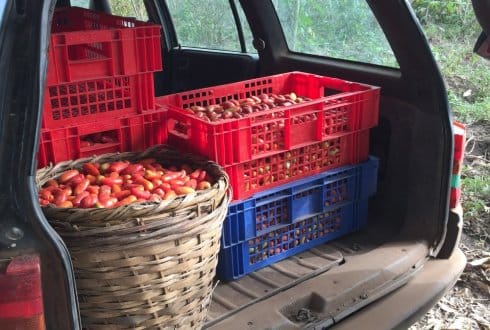A pilot project by Wageningen University & Research in 2017 and 2018 found that Nigerian tomato farmers can reduce their post-harvest losses in terms of both quality and quantity when using plastic crates rather than traditional raffia baskets to transport their crops to the urban centres of Lagos and Ibadan. The project was based on five informal value chains including farmers, transporters, wholesalers and retailers.
The longer-term success of such an intervention depends on all the participants in the tomato value chain accepting and correctly using the crates. The Value Chain Laboratory (VC-Lab) method was used as a way of assessing this and building an understanding of the impact of social factors such as trust, attitudes to risk, and social norms regarding the acceptance of plastic crates. This method uses quantitative analyses, qualitative games and models to simulate future scenarios.
Based on these simulations, researchers were able to recommend creating financial incentives for farmers, develop mechanisms to reduce risks for individual farmers, and strengthen social norms for supply chain actors.
Price bonus as a success factor
The simulations revealed that an important success factor is the bonus that a farmer receives from the wholesaler when transporting tomatoes in a crate. When a 30% bonus is applied to the wholesale price, the percentage of farmers using crates after 30 seasons (under the simulation) increases from 25% to 60%. The loss of A-grade tomatoes was found to drop by almost 50%.
Risk-averse farmers are more likely to return to using raffia baskets due to the higher cost of crates. The extent to which supply chain partners adhere to social norms is another important factor influencing the willingness to use crates. Farmers with a low adherence to social norms are less influenced by the actions of others and are quicker to return to using baskets. Those farmers who have significant trust in their buyers tend to keep using crates. The lifespan and price of the crates themselves have only a limited impact.
Analyses using games and models
The researchers used the Value Chain Laboratory (VC-Lab) to analyse the influence of behavioural factors on opportunities for upscaling in other tomato value chains. As well as a quantitative Value Chain Analysis (VCA) of the tomato value chain, Value Chain Games (VCG) were also used. VCGs use experimental games that explore trust, risk and willingness to cooperate voluntarily as a way of measuring trust between value chain actors, their social norms and their risk tolerance.
Finally, an Agent-Based Model (ABM) was used to simulate the impact of mutual trust, attitudes to risk and social norms on the long-term development of crate usage in various scenarios. For each simulation, 3,000 simulation runs were carried out.
How does simulation with an ABM work?
Each of the 3,000 simulation runs included 130 farmers, 50 wholesalers and 60 retailers across 30 seasons (15 years with two harvests per year). At the start, every participant used plastic crates and for each subsequent growing season every modelled actor chose either plastic crates or raffia baskets, depending on the anticipated profit. Profit was calculated according to the quantity and quality of the tomatoes, the anticipated price and anticipated costs. The quantity and quality of the tomatoes depended on the use of crates or baskets. The anticipated price depended on the level of trust in the trading partner: greater trust led to a higher anticipated price. The way any individual actor weighed up the anticipated costs and rewards depended on their attitude to risk.
The results show that social factors such as social norms, attitudes to risk and mutual trust, as well as prices, are all relevant to the long-term rolling out of plastic crates as a way of reducing post-harvest losses in the Nigerian tomato value chain. Achieving such a reduction requires investment in the development of these factors.
The research was carried out on behalf of the CGIAR-A4NH Flagship Food Systems for Healthier Diets and the Dutch Ministry of Agriculture, Nature and Food Quality.
Source: Wageningen University & Research










